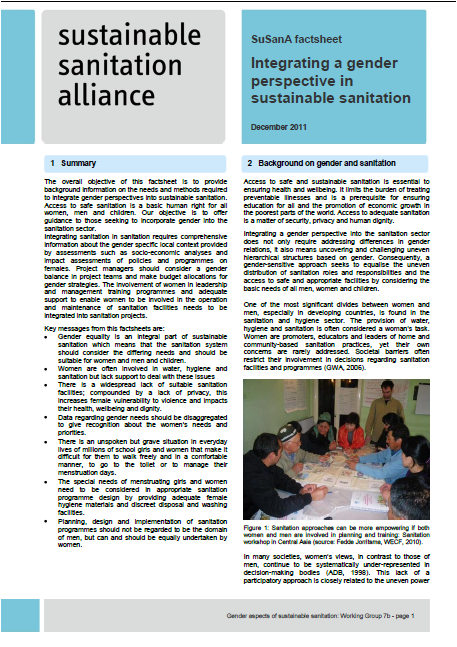Integrating a gender perspective in sustainable sanitation - Factsheet of Working Group 7b
Wendland, C., Dankelman, I., Ruben, C., Kunze, I., Sommer, M., Mbalo, D. (2012)

Published in: 2012
Publisher:
Sustainable Sanitation Alliance (SuSanA)
Author:
Wendland, C., Dankelman, I., Ruben, C., Kunze, I., Sommer, M., Mbalo, D.
Uploaded by:
SuSanA secretariat
Partner profile:
common upload
11890 Views
335 Downloads
Content - Summary
The overall objective of this factsheet is to provide background information on the needs and methods required to integrate gender perspectives into sustainable sanitation. Access to safe sanitation is a basic human right for all women, men and children. Our objective is to offer guidance to those seeking to incorporate gender into the sanitation
sector.
Integrating gender in sanitation requires comprehensive information about the gender specific local context provided by assessments such as socio-economic analyses and impact assessments of policies and programmes on
females. Project managers should consider a gender balance in project teams and make budget allocations for gender strategies. The involvement of women in leadership and management training programmes and adequate
support to enable women to be involved in the operation and maintenance of sanitation facilities needs to be integrated into sanitation projects.
Key messages from this factsheet are:
· Gender equality is an integral part of sustainable sanitation meaning that the sanitation system should consider the differing needs and should be suitable for women, men and children.
· Women are often involved in water, hygiene and sanitation but lack support to deal with these issues· Planning, design and implementation of a sanitation programmes should not be regarded only as a male domain but can and should be equally undertaken by women.
· There is a widespread lack of suitable sanitation facilities compounded by a lack of privacy. This increases female vulnerability to violence and impacts their health, wellbeing and dignity.
· Data regarding gender needs should be disaggregated to give recognition and acknowledgment to women’s needs and priorities.
· There is an unspoken but grave situation in the everyday lives of millions of school girls and women that make it difficult for them to walk freely and in a comfortable manner, to go to the toilet or to manage their menstruation sustainably.
· The special needs of menstruating girls and women need to be considered in appropriate sanitation programme designs by providing adequate female
hygiene materials, discreet disposal and washing facilities.
Bibliographic information
Wendland, C., Dankelman, I., Ruben, C., Kunze, I., Sommer, M., Mbalo, D. (2012). Integrating a gender perspective in sustainable sanitation - Factsheet of Working Group 7b. Sustainable Sanitation Alliance (SuSanA)
Filter tags
English Factsheets and policy briefs Gender equality Publications by SuSanA Publications by SuSanA Sustainable WASH in institutions and gender equality (WG7) Women's rights & representation and empowerment














